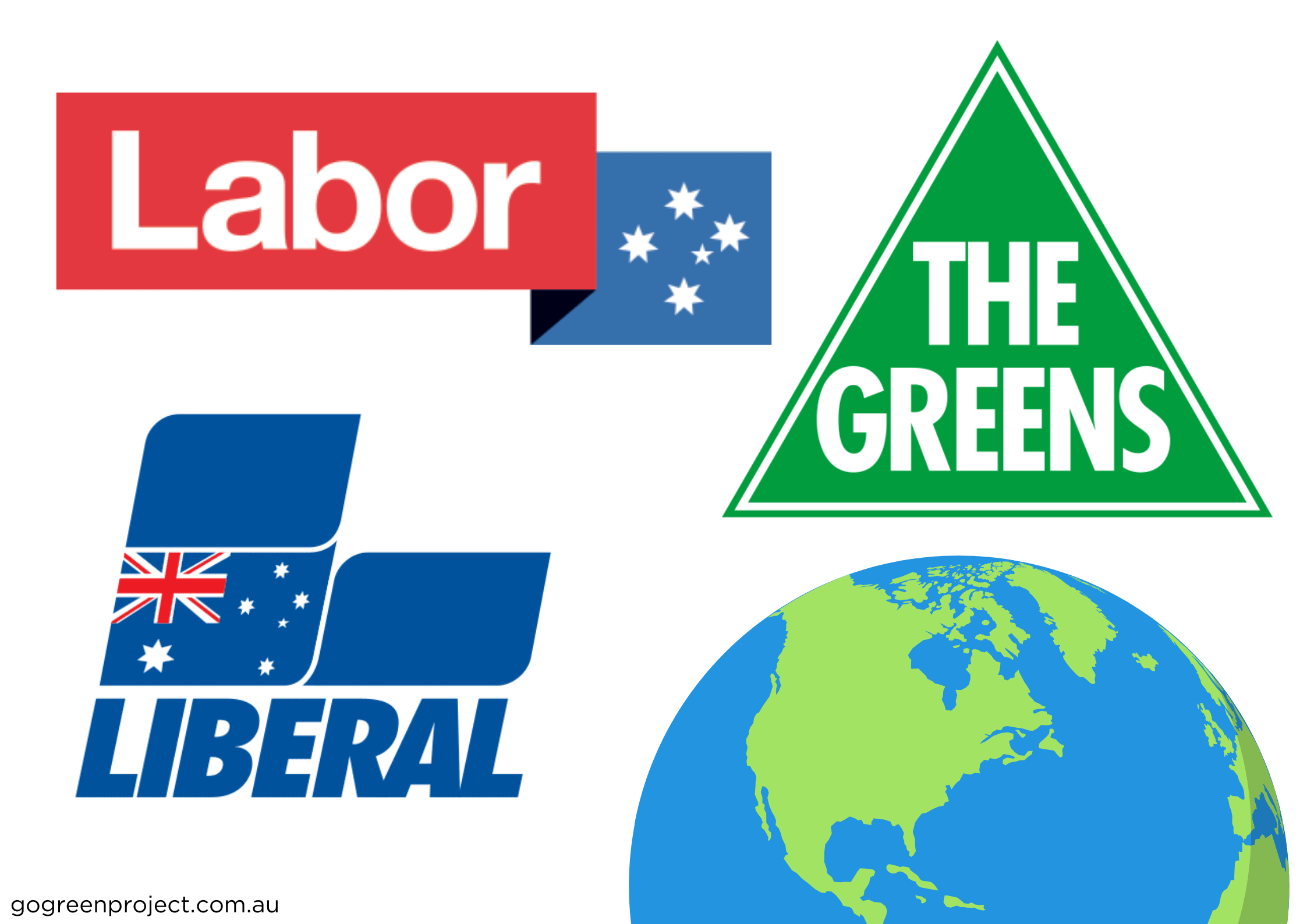With the upcoming Australian federal election, there is a lot of things to consider…cost-of-living, interest rates, population growth, public safety and health services are all growing concerns for Australians in 2025.
But what about climate change? As global warming accelerates and ecological concerns grow, voters need to be looking closely at what each party is offering in terms of renewable energy, conservation, and emissions reduction.
This post breaks down the climate change and sustainability-related policies of Australia’s major political parties to help you make an informed decision and vote for climate action.
Australian Labor Party (ALP)
Labor’s sustainability policies centre on renewable energy investment, green manufacturing, and electrification. Their key initiatives include:
- Renewable Energy Initiatives: Labor’s ‘Future Made in Australia’ policy promotes domestic manufacturing in sustainable energy sectors. This includes a $1 billion ‘Solar Sunshot’ program to support solar panel production and a $566 million ‘Resourcing Australia’s Prosperity’ initiative to map mining resources essential for renewables.
What does a ‘Future Made in Australia’ mean for Australia’s climate?
- Green Hydrogen and Critical Minerals: The ALP is investing $22.7 billion over a decade to support green hydrogen production and critical mineral mining, key components of the renewable energy transition.
- Electrification of Social Housing: Labor has allocated $500 million to electrify social housing, reducing reliance on fossil fuels and lowering energy costs for vulnerable Australians.
Labor’s approach leans heavily on economic growth through sustainability, emphasising job creation in green industries while cutting emissions.
TL;DR: Labor is betting on renewables, green manufacturing, and housing electrification to drive sustainability.
Environmental Conservation and Biodiversity
The ALP has committed to:
- Zero New Extinctions: Setting a target to prevent any new extinctions of native species.
- Protected Areas: Aiming to protect 30% of Australia’s land and water by 2030.
- Recycling Initiatives: Investing in recycling and promoting a circular economy.
These initiatives are part of their broader plan to build a “nature positive” Australia.
Economic Measures
To support Australians facing economic challenges, the ALP proposes:
- Tax Cuts: Providing tax relief to all taxpayers.
- Affordable Childcare: Making childcare more accessible and affordable.
- Cheaper Medicines: Reducing the cost of essential medications.
- Energy Bill Relief: Offering support to lower energy bills.
- Fee-Free TAFE: Providing free vocational education and training.
These measures aim to alleviate cost-of-living pressures without exacerbating inflation.
Liberal-National Coalition
The Coalition’s approach to sustainability focuses on energy security, resource development, and deregulation. Their main policies include:
- Energy Policy and Nuclear Considerations: The Coalition is proposing zero-emissions nuclear energy as part of Australia’s energy mix, arguing that it provides a stable and cost-effective solution alongside renewables.
Read more about nuclear power in Australia
- Economic Growth and Environmental Balance: They plan to boost the mining and resources sector by cutting approval times and reducing regulations, aiming to balance economic growth with environmental concerns.
While the Coalition supports emissions reduction, their strategy relies on existing industries and nuclear power rather than aggressive renewable energy expansion.
TL;DR: The Coalition is backing nuclear energy and resource development while reducing regulatory hurdles.
Note:
- The Coalition has expressed support for nuclear energy, but specific details on site locations, implementation timelines, and costs are still being debated.
- While they argue that nuclear is a stable and cost-effective solution, the claim that it is “cost-effective” is contested, as nuclear power plants require significant investment and have long lead times.
Economic Strategy
The Coalition’s plan focuses on:
- Low Inflation: Reducing wasteful spending and cutting red tape to manage inflation.
- Consumer Protection: Safeguarding consumers and small businesses from misuse of power by corporations or unions.
This approach aims to stabilise the economy and foster growth.
Environmental Policies
The Coalition has outlined plans to:
- Expand Protected Areas: Increase Queensland’s Protected Area Estate, focusing on private land and nature refuges.
- Support Nature Refuges: Enhance conservation efforts on privately owned lands.
These policies are designed to bolster environmental conservation.
Australian Greens
The Greens advocate for bold climate action, renewable energy, and conservation efforts. Their platform includes:
- 100% Renewable Energy by 2030: The Greens propose a Green New Deal that prioritises solar, wind, and green hydrogen while revitalising Australian manufacturing for sustainable industries.
Read the Australian Greens plans for 100% Renewable Victoria
- Stronger Environmental Protections: Policies focus on phasing out single-use plastics, expanding recycling facilities, and tackling habitat destruction and species extinction.
- Fossil Fuel Phase-Out: The Greens want to end subsidies for fossil fuel companies and accelerate Australia’s transition away from coal and gas.
With a no-compromise stance on climate action, the Greens’ policies are the most ambitious in terms of emissions reductions and environmental protections.
TL;DR: The Greens want a rapid transition to renewables, stronger environmental laws, and a fossil fuel phase-out.
Note:
- The Greens do advocate for 100% renewable energy by 2030, but this is an extremely ambitious target.
- Australia’s current national goal is 82% renewable energy by 2030, and major infrastructure changes would be required to meet the Greens’ proposed goal.
- It’s worth noting that experts debate whether this timeline is feasible given current grid and storage capacity.
Environmental Initiatives
The Greens advocate for:
- National Water Commission: Re-establishing and expanding its remit to safeguard water resources.
- Greywater Recycling: Investing $300 million in greywater recycling systems for households and communities.
- Conservation Incentives: Reviewing taxes to encourage private sector and landholder participation in conservation.
These initiatives aim to protect and restore Australia’s natural environment.
Policy Principles
The Greens’ policies are grounded in principles that emphasise:
- Ecological Sustainability: Ensuring that environmental considerations are central to policy decisions.
- Social Justice: Promoting fairness and equity in society.
- Peace and Non-Violence: Advocating for peaceful solutions and conflict resolution.
- Democracy: Enhancing democratic processes and public participation.
These core values guide their comprehensive policy framework.
Sustainable Australia Party (SAP)
SAP focuses on a holistic, evidence-based approach to sustainability. Their key positions include:
- Decoupling Sustainability from Political Ideology: SAP promotes pragmatic, science-based policies rather than aligning with traditional left or right-wing politics.
- Community and Environment First: They advocate for a sustainable population policy, better urban planning, and stronger environmental protections.
Unlike the Greens, SAP focuses more on sustainable urban development and political reform rather than large-scale energy transitions.
TL;DR: SAP emphasises sustainability through pragmatic, science-based policies and urban planning.
Policy Focus
SAP’s policies encompass:
- Population and Immigration: Advocating for sustainable population growth by reducing immigration intake to 70,000 per annum.
- Environmental Conservation: Implementing measures to protect biodiversity and ecosystems.
- Urban Planning: Promoting better planning to prevent over-development and preserve natural habitats.
These policies aim to balance environmental sustainability with quality of life.
Core Values
SAP’s objectives include:
- Sustainability: Ensuring economic and social progress while protecting the environment.
- Wellbeing: Enhancing the quality of life for current and future generations.
- Biodiversity Preservation: Maintaining the diversity of ecosystems and species.
These values underpin their policy initiatives.
Emerging Parties and Independents
New players in the political landscape may also shape sustainability policies. One notable newcomer is Australia’s Voice, a party formed by Fatima Payman. While their stance on sustainability is still developing, they could influence the debate in Parliament.
TL;DR: Independents and new parties could bring fresh sustainability perspectives into the election.
TL;DR for Each Party’s Climate Change Policies
Australian Labor Party (ALP)
Labor is focused on renewable energy investment, green manufacturing, and conservation. They aim for zero new extinctions, protect 30% of land and water by 2030, and promote green hydrogen and critical minerals. Their economic relief measures include tax cuts, cheaper medicines, and energy bill support.
Labor = Green industry growth + conservation + economic relief
Liberal-National Coalition
The Coalition prioritises economic stability, nuclear energy, and resource development. They support zero-emissions nuclear power, cut red and green tape for mining, and expand conservation on private lands. Their economic focus is on lowering inflation and reducing government spending.
Coalition = Nuclear energy + deregulation + economic growth
Australian Greens
The Greens advocate for 100% renewable energy by 2030, phasing out fossil fuels, and stronger environmental protections. Their plan includes a national water commission, greywater recycling, and habitat conservation. They also focus on social justice and democratic reform.
Greens = Rapid renewables + end fossil fuels + stronger conservation laws
Sustainable Australia Party (SAP)
SAP takes a pragmatic, evidence-based approach to sustainability. They support slow population growth (lower immigration), urban planning reforms, and biodiversity preservation. Their focus is on preventing overdevelopment while balancing economic and environmental interests.
SAP = Sustainable population + urban planning + biodiversity conservation
Each party has a different vision for sustainability, choose the one that aligns with your priorities!
Australia’s political parties offer distinct sustainability approaches, from Labor’s green industry push to the Greens’ aggressive climate action, the Coalition’s nuclear pivot, and SAP’s urban planning focus. As voters, understanding these policies is crucial in shaping Australia’s environmental future.
Whichever way you lean, consider sustainability when casting your vote. Climate action starts at the ballot box!

